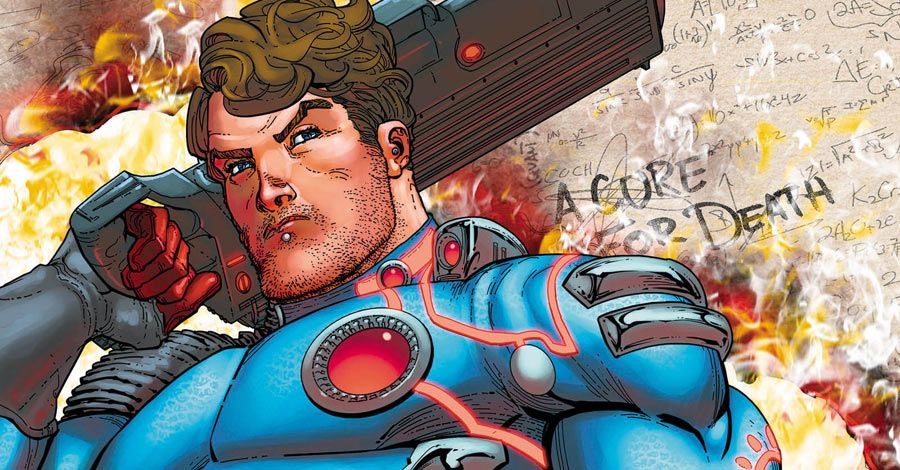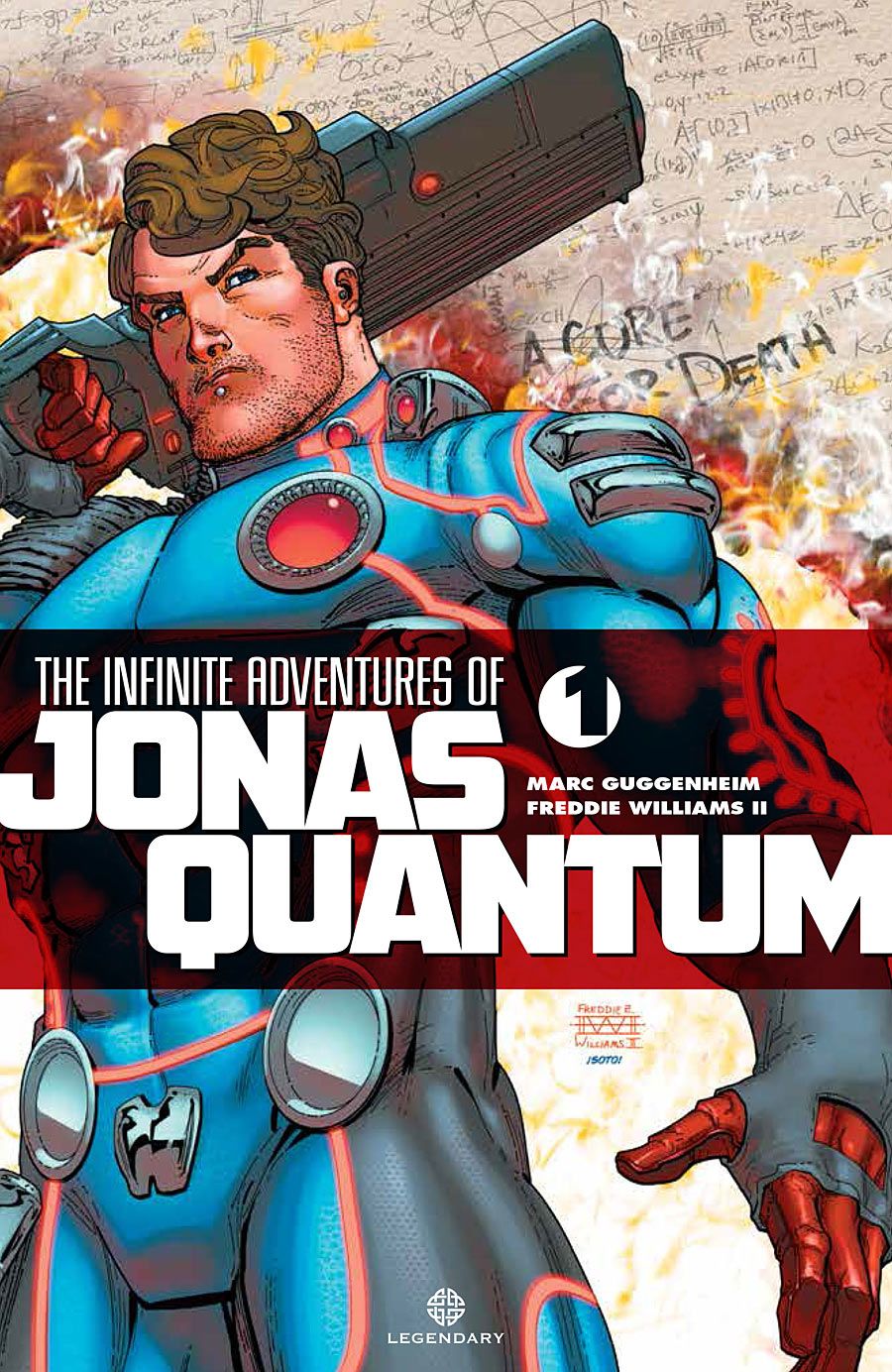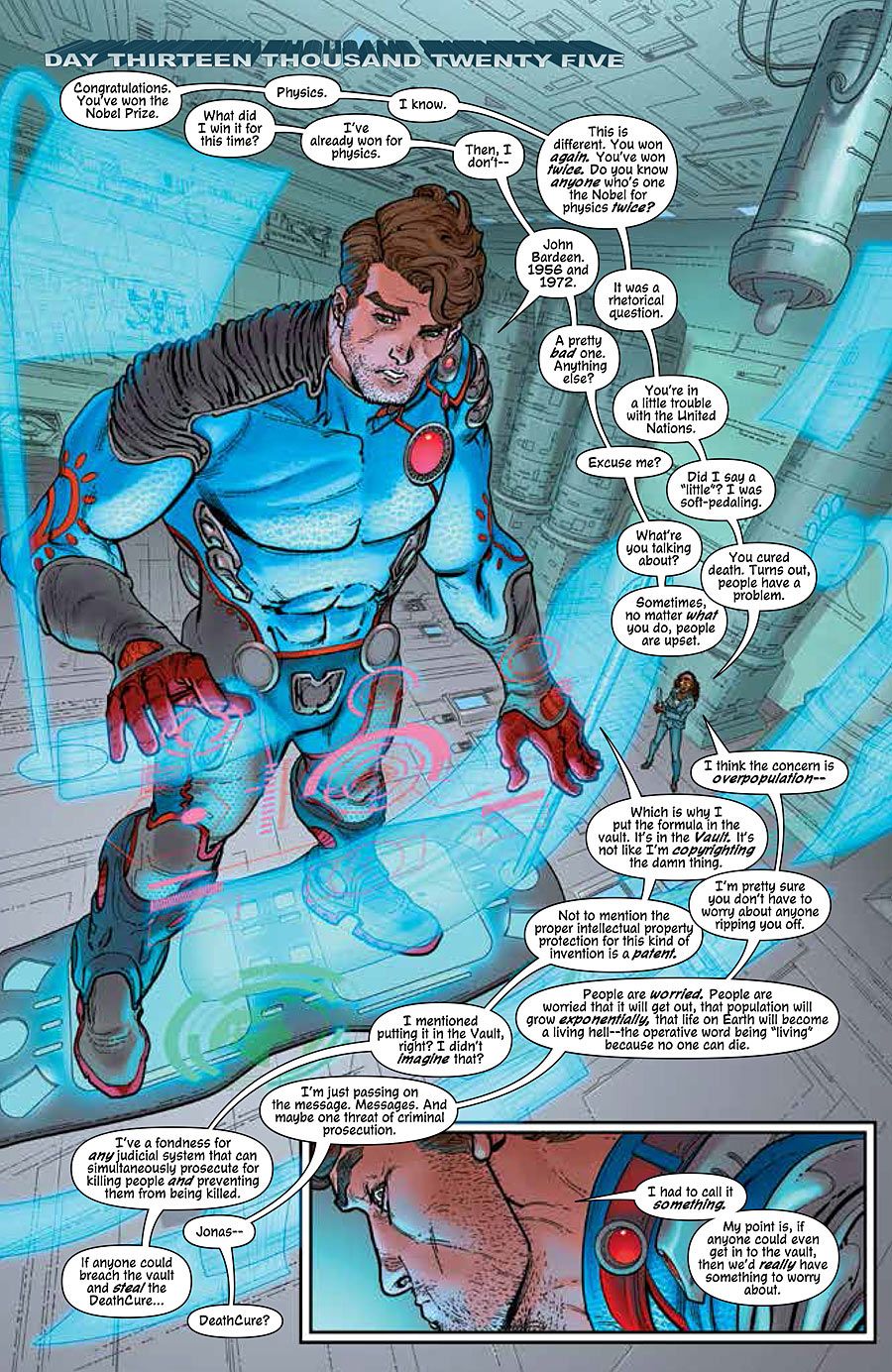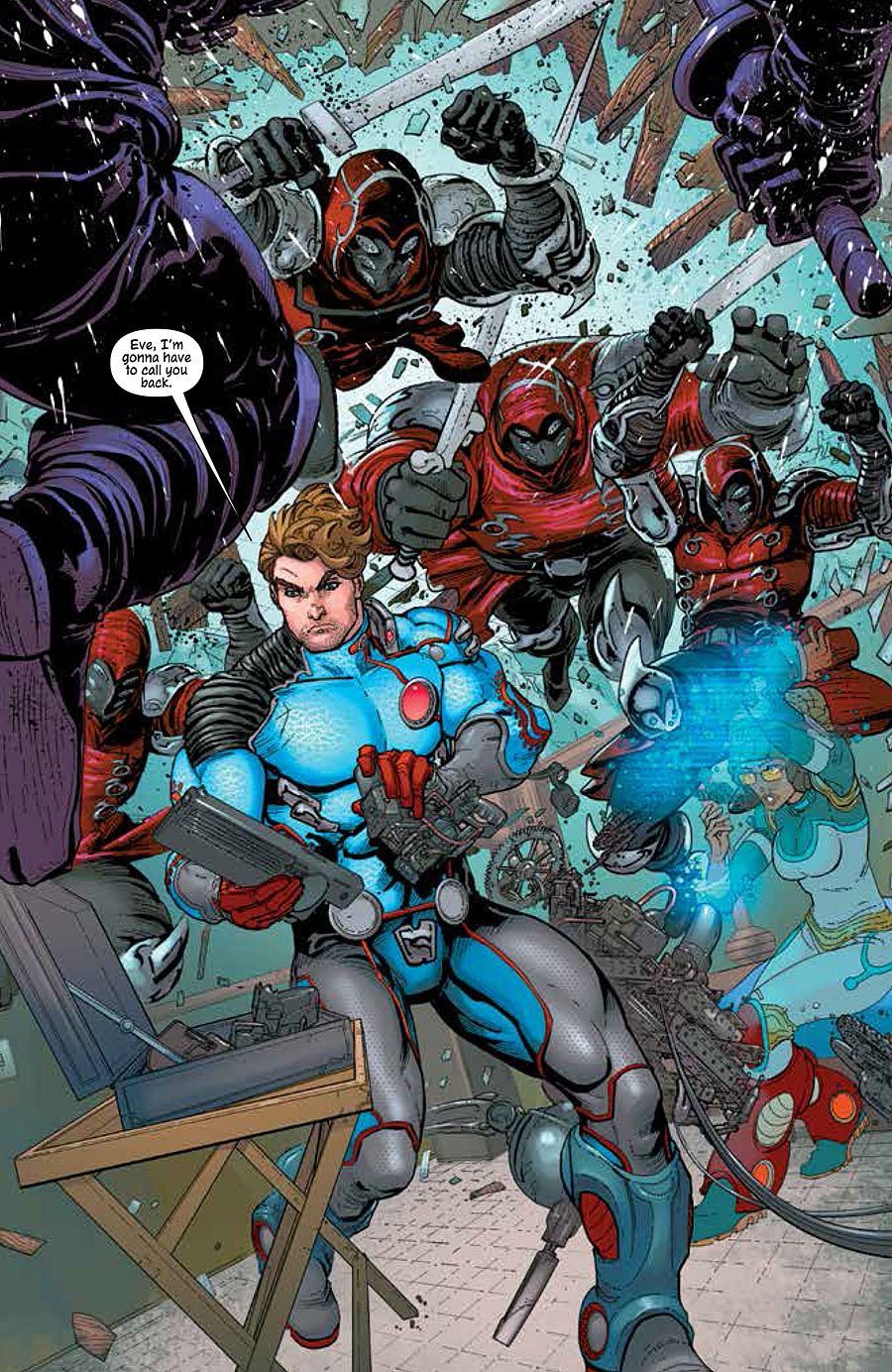With great power comes great responsibility -- but with great intelligence and rampant curiosity comes amazing and incredible scientific adventures through space, time, and everything and anything in between.
With "The Infinite Adventures of Jonas Quantum," creator and man-that-never-sleeps Marc Guggenheim (who along with penning the new comic book series from Legendary Comics executive produces and writes for both "Arrow" and the upcoming "Legends of Tomorrow" for The CW) unlocks the doors to creativity and breaks up the box of high sci-fi concepts. With art by Freddie Williams II, the six-issue series focuses on super scientific genius Jonas Quantum as he travels through time, cures the eternal disease of death, shatters the barriers between worlds and more.
"Arrow" EP Marc Guggenheim Writing Legendary's "Jonas Quantum" Series
CBR News spoke with Guggenheim while he took a short break during his television duties in Vancouver, Canada, to pick his brain on the upcoming series, the drawbacks of super-intelligence and how Gene Hackman informs his creativity.
CBR News: From the description, this book seems to really encapsulate a fun, sci-fi, pulp adventure. Would you say that's a fair assessment, and what kind of spirit were you channeling when you set out to write?
Marc Guggenheim: Yeah, I think that's a great way to describe it. It's a bit of an homage or love letter to the Bronze Age and Silver Age comics I grew up with, but we're not trying to recreate that reading experience. We're trying to do something that's new and modern and different. The comparison I typically draw is to "Indiana Jones." That was an homage to the serials to the 1930s and "Star Wars" was an homage to Buck Rogers and Flash Gordon. But obviously those subjects were tackled with a -- at the time -- modern sensibility. The idea here is that you'll pick this up and it'll feel like a book from 2015 and not a book from 1962 but hopefully it'll invoke some of those nostalgic feelings in people.
If you look at those old sci-fi stories from the '50s and '60s, they tended to look at and explore what technology would be like "in the future" of the 1960s. For your book, are you taking a similar approach but looking at what the future of technology would be for us?
It's definitely a book of big ideas, and among those big ideas, it looks at where can technology go. I think trying to predict future technologies can be a bit of a sucker's game. Very few people have done it well. But I think what I'm trying to do is take my imagination off the leash and think what's possible and play around with that and let that create stories in some cases and complicate stories in other cases.
I want to talk about the format and how it plays into what you talked about with "big ideas." It's a six-issue series currently, so are these done-in-one style stories with each issue containing a "big idea?"
Well, it's six issues for the time being but we'll probably do more. We have to take a little bit of a break in-between just because of my schedule and Freddie's schedule. But the title of the book is "The Infinite Adventures" so that would imply more than six issues. But yeah, each issue is done-in-one. There is a little bit of a serialized but the interconnectivity between each issue is that each issue reveals a little bit more about Jonas. Each issue you get a new understanding and a new perspective on him. That's where the "serialization" comes from. And the sixth issue I'm sort of writing like a season finale where I'm going to tie together a bunch of different elements that I introduce in the first five issues. But you don't need to reach issues #1 through #5 to understand issue #6. Every issue stands on its now.
So instead of having a, let's say, "Big Bad"-style thread throughout the entire thing, the real throughline and plot is about Jonas' character journey?
Yeah. I would say there's several different plots but the connective tissue between every issue is Jonas's character.
Guggenheim Talks New "Arrow" Characters, Calls "Legends of Tomorrow" His "Craziest Show" Ever
Well, let's talk about that character. What type of person is Jonas? We know he's super-intelligent, but what is he like as a person?
I think he's very curious. He's obviously very inventive. It's not just about intelligence. It's a kind of thinking. It's not just being smart -- it's about being curious and inventive and creative. He's sort of all these things, but at the same time, because he's so intelligent, it prevents him from connecting with people and he's sort of a tragic figure in that sense. His intelligence, which is a great blessing, is also a curse, because it keeps him from forming human connections and as a result, he's kind of lonely.
You see a lot of that in fiction: the genius removed from the rest of humanity. Reed Richards, you see his marriage and relationships suffer at times because of his intelligence. Even something as eccentric as "Rick and Morty," Rick suffers from relationship issues.
It's funny because people often bring up the Reed Richards comparison but the one thing I sort of point out in regards to Jonas is that at least Reed was able to go on a date with Sue. Occasionally he gets lost in his lab but the truth of the matter is that he's able to bring himself to a normal person's level and have a regular conversation; he was able to form a romantic connection with Sue. I don't think Jonas is capable of that at the present time. I think it's the nature of very intelligent people to struggle with communication.
It's like they're extremely logical so they have to lock off emotion.
That's a great way of putting it. [Laughs]
I want to ask about the eponymous "Adventures." Can you tease a little about the adventures we'll be seeing? There's mention of time travel and parallel worlds.
Yeah. There's time travel, there's parallel universes, there's pocket universes. One of the more out there issues is an issue where it takes place in a realm where time moves backwards so the whole issue is told like the comic book version of "Memento." What's wonderful about is the book is that every time I write a new issue, the sky is the limit because we are doing done-in-one and I really want to capture that feeling of the first hundred issues of "Fantastic Four" where they were almost being reckless with the number of ideas they were playing with. You opened up the book and you never knew what was going to happen. Each issue is different kind of animal. Each issue is kind of like its own beast.
With each issue playing with a different idea, is it almost like you're tackling each subset of the sci-fi genre with each issue?
Not consciously. I don't have a list of sci-fi conventions that I'm working my way down. It really is like each issue is written in reaction to the previous issue. Issue #2 is more of a heavy, high-concept issue, so issue #3 I wanted to be more of a character drama.
You mention dealing with time travel in this book. Is that difficult to one, conceptualize and two, make rules for? It is difficult to plot a story dealing with time travel?
Yes and no. I would say that if you are diligent about crafting the rules you're going to follow from the outset, then the challenge is just to follow them, which at least makes things a little easier, you know? Once you've done that work, theoretically, everything is a little bit easier because you know what you can and can't do.
Where do you draw inspiration from for these high concepts?
I would say the influences of this book are heavily the first hundred issues of "Fantastic Four," Grant Morrison, Warren Ellis. These guys, their writing is also very reckless in terms of ideas. I've seen Grant Morrison waste on one panel an idea that could have grown its own franchise. For him, it's like the billionaire that lights his cigarettes with hundred dollar bills because he has that many ideas. [Laughs] I don't, but I'm trying to channel a little bit of that.
There's an issue of Grant's "JLA" where I believe it's the Flash and Green Lantern get transported to this other world and there are these giants sitting around a table. Flash and GL ask them for help and they basically say, "We don't have time for your squabbles. We're dealing with things on a scale you can't comprehend." That right there is, like, "That! I want to see more of those guys!"
That's exactly it. There's a line in "Heist" where Gene Hackman's character says, "I picture a guy smarter than myself and I think, 'What would he do?'" I'm basically trying to picture a writer smarter than myself and ask, "What would he write?"
"The Infinite Adventures of Jonas Quantum" by Marc Guggenheim and Freddie Williams II begins September 16 from Legendary Comics.




